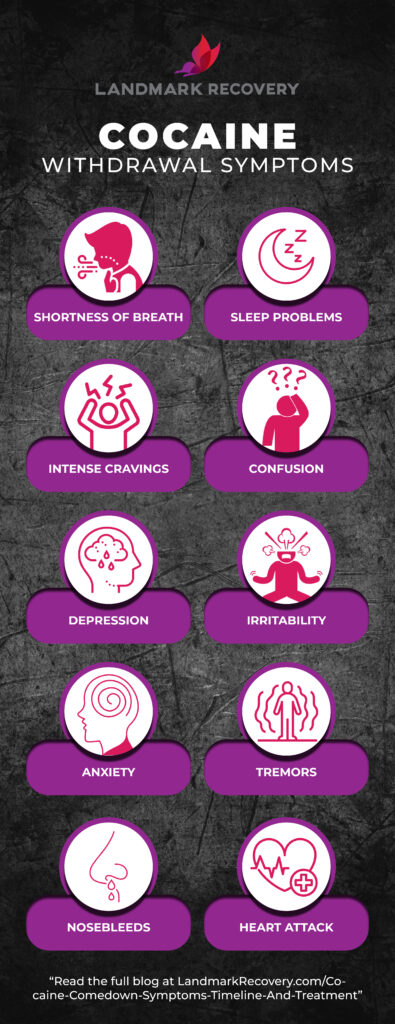Understanding Cocaine’s First Withdrawal Stage
If you or a loved one has ridden the cocaine high, you know it doesn’t last forever. What follows is a harsh reality– a crash, or “cocaine comedown,” that feels like you’ve hit a wall. A national survey revealed that 1.4 million Americans aged 12 and up struggled with cocaine use. This statistic proves that you’re not alone in this draining cycle, especially when addiction is involved.
What is Cocaine? A Quick Overview
Cocaine, a powerful stimulant, comes from the South American coca plant. Recreational use boosts brain activity, giving users a short, intense rush and heightened alertness. The drug also causes your heart rate and blood pressure to spike.
Here’s the Kicker
Cocaine drains your brain’s dopamine levels, leading to the inevitable “crash” or come down. If you try to quit cocaine cold turkey, withdrawal kicks in. Long-term cocaine use exhausts your brain and strains your heart, heightening cardiovascular risks.
This blog explores the lows of a cocaine comedown, the associated risks, and how to get professional help, like addiction treatment.
Editor’s Note: This blog aims to help but should NOT replace professional medical advice. If you’re struggling with cocaine addiction, consult healthcare providers for diagnosis and treatment.
What is a Cocaine Comedown?
A cocaine comedown is another way to describe the first phase of cocaine withdrawal, scientifically known as “acute withdrawal” or the “crash.” Symptoms usually appear within hours after your last “hit.” This quick onset is your body’s first response to missing the drug. Knowing what you’re up against is vital for your health and potential recovery.
What Does a Cocaine Comedown Feel Like?

Cocaine withdrawal, or a “cocaine comedown” can lead to cardiovascular issues like heart attacks.
A cocaine comedown feels like a crash that can hit you just hours after your last use, whether you snort, smoke, or inject the drug. Your heart rate and blood pressure soar, you might find breathing hard, and your mental health can suffer. Symptoms you may encounter include:
- Elevated heart rate
- High blood pressure
- Shortness of breath
- Tiredness
- Hunger
- Restlessness
- Intense cocaine cravings
Withdrawal Symptoms
After the immediate crash, if you try to quit cocaine cold turkey, expect a range of withdrawal symptoms. They can range from moderate to severe and might include:
- Paranoia
- Sleep problems
- Depression
- Anxiety
- Restlessness
- Tremors
- Confusion
- Intense cravings
- Fatigue
- Irritability
- Memory issues
- Decreased appetite
- Concentration problems
These withdrawal symptoms often follow the initial comedown and can make recovery challenging.
Immediate Health Risks
Your body faces immediate risks. Heart rate soars, blood pressure spikes, and anxiety or paranoia can set in. You may experience:
- Constricted blood vessels
- Increased body temperature
- Anxiety and paranoia
- Tremors and muscle twitches
- Heart attack or stroke
- Nosebleeds (if snorting)
- Respiratory failure
Dangers and Associated Risks

Cocaine abuse can lead to migraines, seizures, and high blood pressure in expecting mothers.
Navigating a cocaine comedown isn’t just about immediate discomfort. The withdrawal phase can carry severe long-term risks. Here’s a closer look at what you could face.
Pregnancy Risks
If you’re pregnant, a cocaine comedown isn’t just about you. It’s also about the life inside you. Studies estimate around 750,000 cocaine-exposed pregnancies each year.
Here’s how cocaine withdrawal increases the risks:
- Maternal Issues: Cocaine use can cause migraines, seizures, and high blood pressure in expecting mothers.
- Pregnancy Complications: Cocaine withdrawal increases risks, like premature membrane rupture and separation of the placenta.
- Baby’s Health: Cocaine use can cause babies to arrive prematurely, have low birth weights, and have smaller head sizes.
Experts suggest specialized addiction treatment with prenatal care to lower these risks.
Social and Legal Fallout
You’re risking more than your health if you struggle with cocaine withdrawal. Federal stats show that 45% of U.S. inmates committed drug offenses. Your comedown could lead to:
- Job Loss: Struggling to focus at work because of withdrawal? That can get you fired, even if you’re a top performer.
- Money Woes: Buying cocaine regularly drains your wallet. A comedown can make you make poor financial choices, like pawning valuables to get your next fix.
- Strained Relationships: Imagine snapping at your partner or kids due to mood swings during withdrawal. This can break trust and even end relationships.
The stakes are high. Don’t let a comedown define you. Seek help to avoid these harsh realities.
Risks of Mixing Cocaine with Other Substances
If you’re coming down from cocaine, don’t risk mixing it with other drugs, especially heroin. This cocktail, often called “speedballing,” can trigger cardiac arrest, respiratory failure, and even death. Cocaine-related overdose deaths increased 22% from 2020 to 2021, resulting in 24,486 lost lives by year’s end.
Mixing cocaine with other drugs harms your body and worsens addiction and mental health symptoms. Therefore, it’s crucial not to ignore the dangers.
How Long Does a Cocaine Comedown Last?
If you’re wondering how long a cocaine comedown lasts, the answer varies from person to person. Cocaine’s effects usually weaken within an hour. However, the time it takes to leave your system can change based on individual factors, like:
- How Much You Use: The more cocaine in your system, the longer it will take to leave.
- How Often You Use: Regular use can make cocaine stick around longer in your body.
- Body Weight: It could take longer to process the drug if you weigh more.
- Metabolism: A faster metabolism can help you eliminate cocaine more quickly.
- Hydration: Drinking water can speed up the elimination process.
- Personal Health: You’ll likely process and eliminate the drug faster if your liver and kidneys are healthy.
Note: This is just general information, not medical advice. Everyone’s different, so it’s best to seek professional help when dealing with addiction.
How to Spot a Cocaine Overdose
It’s crucial to know the signs of an overdose, especially if you or someone you know struggles with cocaine abuse.
Here are some signs that you shouldn’t ignore:
- Breathing Problems: If it’s hard to breathe, that’s a significant warning sign.
- High Body Temp: Feeling unusually hot could mean trouble.
- Paranoia: Intense feelings of mistrust or fear are red flags.
If any of these symptoms show up, find medical help immediately. Drug overdose is life-threatening and requires immediate attention.
How to Come Down From Cocaine
If you’re dealing with a cocaine comedown, know you don’t have to go through it alone or without help. The comedown, or crash, can be intense, but there are things you can do to help yourself.
Healthy Tips to Handle a Cocaine Comedown
- Stay Hydrated: Drink water and eat well to help your body detox and recover.
- Rest: Find a calm space, lie down, and try to relax or sleep.
- Avoid Temptation: Clear your stress and triggers, and stay with supportive people.
For a more in-depth look at these tips, check out our full blog, “How to Come Down From Cocaine.”
Cocaine Comedown: Navigating the Challenges
Coping with a cocaine comedown is more than just waiting it out. We’ve discussed the risks, signs, and healthy tips to manage the symptoms, but let’s be clear: the safest, most effective way to handle cocaine withdrawal is to seek professional medical advice from a doctor or opt for specialized addiction treatment.
Professional Cocaine Treatment at Landmark Recovery
If you or a loved one are grappling with cocaine comedown challenges, take your next positive step with Landmark Recovery. Our comprehensive drug treatment programs and rehab centers are located in various states:
We’re also a phone call away—anytime, day or night. Confidentially contact our Patient Navigators at 888-448-0302. A renewed, healthier life is waiting.

Choose Recovery Over Addiction
We're here 24/7 to help you get the care you need to live life on your terms, without drugs or alcohol. Talk to our recovery specialists today and learn about our integrated treatment programs.





